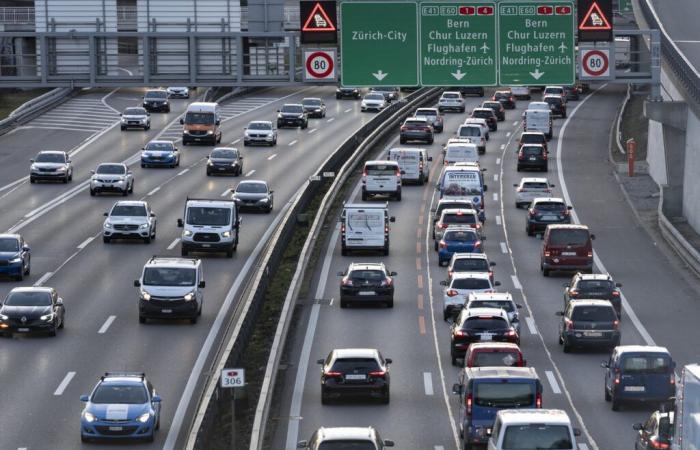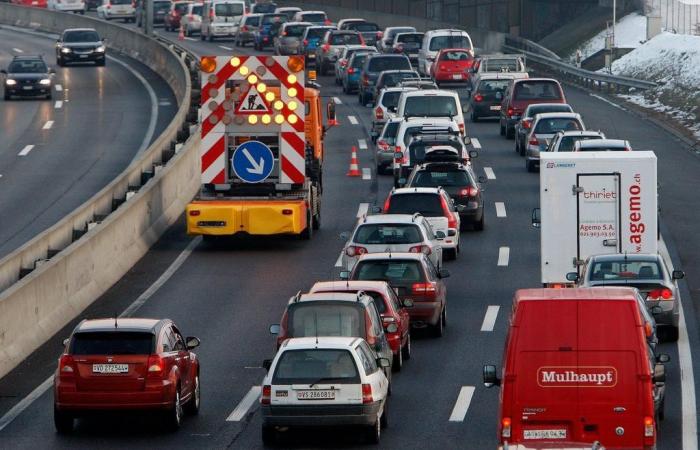A traffic jam on the A1 motorway before Wallisellen, towards Zurich, on Tuesday, February 6, 2024. This section is one of the busiest in the country.
Keystone / Gaetan Bally
The Federal Council wants to extend the A1 motorway to at least six lanes on the Bern-Zurich and Lausanne-Geneva sections. Cost of the new infrastructure: 5.3 billion francs. A referendum has been successfully launched. The Swiss people will vote on 24 November.
This content was published on
September 25, 2024 – 08:47
The A1 stretches from east to west of Switzerland over 410 kilometres. It is the longest motorway in the country. It is also the most affected by traffic jams with 16,279 hours of traffic jams in 2023, according to the Federal Statistical Office. To combat bottlenecks, the Federal Council has proposed to Parliament the financing of six motorway extension projects – five in German-speaking Switzerland, one in French-speaking Switzerland – ready to be implemented.
The Federal Chambers approved these expansions in September 2023. In the name of climate protection, a broad alliance led by the Transport and Environment Association (ATE) and the environmental association actif-trafiC immediately launched a referendum entitled “Stop the motorway madness”. Within three months, 100,000 signatures, i.e. double the number of signatures required, were collected, with the support of the Greens and the Socialist Party in particular.
What exactly does the development of the road network initiated by the Federal Council provide for?
As part of the Strategic Development Programme for National Roads (PRODES) 2030, the Federal Council is launching construction projects worth 11.6 billion francs to preserve the operation of the network. Every four years, it submits a development phase to Parliament for consultation.
The 2023 development phase, against which the referendum was launched, concerns six motorway extension projects. In French-speaking Switzerland, the Le Vengeron (GE)-Coppet (VD)-Nyon (VD) axis is to be widened to two times three lanes over a distance of around 19 kilometres. In German-speaking Switzerland, the projects concern the Wankdorf-Schönbühl (BE) section, which is to be increased from six to eight lanes, as well as the Schönbühl-Kirchberg (BE) section, which will increase from four to six lanes. The Fäsenstaub (SH), Rhine (BS/BL) and Rosenberg (SG) tunnels will be doubled.
What are the arguments for expanding highways?
The Federal Council wants to increase the availability and safety of national roads. It intends to remove bottlenecks at strategic locations and thus improve traffic flow. The projects aim to relieve congestion in surrounding towns and municipalities. The aim is to avoid, in the event of traffic jams on the motorway, a transfer of traffic to cantonal and municipal roads, which clogs up certain localities and affects the quality of life of the inhabitants.
As the Swiss population continues to grow, supporters of additional lanes stress the need to modernize motorways considered to be outdated. It is important to have suitable, functional and reliable infrastructure to meet the needs of increasing mobility. Mobility is synonymous with freedom, employment and prosperity, according to the president of the Touring Club Switzerland (TCS), Peter Goetschi.
It is also a question of ensuring supplies. These roads are of systemic importance for the transport of goods, say business circles.
What are the arguments against highway expansion?
The national road development projects are incompatible with the climate objectives that the Confederation set itself by ratifying the Paris Agreement, the referendum alliance stresses. Currently, road traffic is already responsible for a third of CO₂ emissions in Switzerland. It is urgent to think about sustainable mobility and to develop the public transport offer rather than expanding the motorway network, according to the ATE. The planned expansion is “exaggerated and outdated”.
Every new road creates a pull factor: supply creates demand, say organisations opposed to the projects. Opponents of the development of the car infrastructure are also concerned about the concreting of Switzerland. This is ruining the landscape, destroying arable and wooded land, areas for promoting biodiversity and recreational areas.
Above all, the cost of the new infrastructure is considered “exorbitant”: a real “waste”, denounces actif-trafiC. The projects will amount to 5.3 billion francs, a figure that does not include the billions for future maintenance, argues the association. On the other hand, while they are certainly financed by taxes on gasoline and vehicle taxes, it is the population “who pays the external costs of the damage caused by traffic: accidents, noise, pollution, health, damage to the climate and the environment”, continues actif-trafiC.
More
What measures should be taken to ease congestion on Swiss motorways?
The people will vote on 6 highway expansion projects on November 24. What do you think? We are interested in your opinion.
See the discussion
Who supports highway development?
The Federal Council and Parliament support the expansion of the motorways. Among the main political parties, the right-wing parties, led by the SVP, recommend accepting the submitted projects. Unsurprisingly, automobile protection associations such as the TCS and autosuisse, as well as business organisations such as the Swiss Union of Arts and Crafts (USAM) and economiesuisse, are in favour of the planned expansions. Grouped together under the alliance “Yes to ensure the future of national roads”, they have already launched the campaign for the vote under the slogan “For a Switzerland that moves forward”.
Who is against highway expansion?
A broad alliance wants to put a stop to the widening of the six planned motorway sections. It brings together environmental and climate protection associations such as Greenpeace, WWF, the Swiss Climate Alliance and BirdLife, as well as the Greens and the Socialist Party. The Doctors for the Environment and the Swiss League Against Noise are also part of it. As are farmers’ organisations such as Uniterre and the Association of Small Farmers.
Text proofread and verified by Samuel Jaberg
Learn more
Following
Previous
More
“Mobility is not an end in itself”
This content was published on
May 26, 2016
Three billion francs from the mineral oil tax will be used exclusively for road construction and maintenance if the people approve the initiative “For fair financing of transport” on June 5. Currently, half of this sum goes to roads. Is the so-called “cash cow” initiative a step in…
read more “Mobility is not an end in itself”







